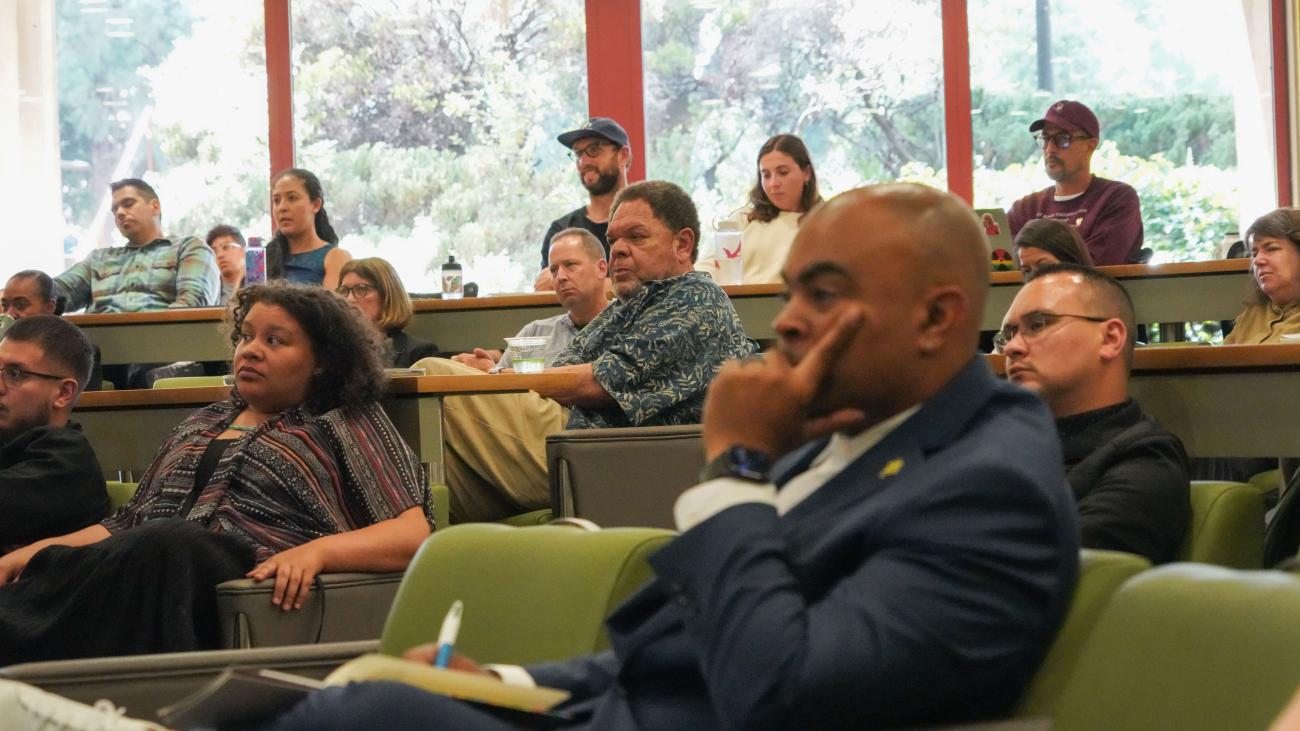
‘A responsibility to make schools better’: Stanford GSE research seminar focuses on translating research to actionable change
Na'ilah Suad Nasir, prominent education scholar and president of the Spencer Foundation, a leading funder of education research, says that a conversation with her daughter a few years ago caused her to reexamine her entire career.
She was packing for a meeting of the American Educational Research Association when her then-teenage daughter asked a question that stopped Nasir short: “If you and your researcher friends have been studying schools and presenting at conferences for more than 20 years, why is it that schools are getting worse?”
It was at this moment, Nasir said, that she realized it was all too common for those in the field of education research to have “an illustrious career with little to no impact.” Her daughter’s challenge, she saw, should lead her and others in the field to lean into higher expectations for tangible change, especially by collaborating with changemakers outside of the academic sphere to create a better future.
Nasir reflected on that realization during her keynote speech on May 25 at the GSE’s third annual Ball Lecture, an event organized by the Race, Inequality, and Language in Education (RILE) program at Stanford Graduate School of Education (GSE).
“We, as educational researchers, need to take seriously the responsibility that we have to make schools better, to foster education systems that serve to develop the full potential of our young people, and undo the harmful impacts of education’s legacy of racist systems and thinking,” said Nasir, who served on the GSE faculty from 2000 to 2008.
The Ball Lecture, launched in 2021, is a year-end research seminar on race and inequality in modern education. The event is named in honor of Arnetha Ball, the Charles E. Ducommun Endowed Professor of Education, Emerita, and former RILE chair.
Bryan A. Brown, a GSE professor and current chair of the RILE program, opened the event this year with a speech written by ChatGPT in the style of the late African American politician Shirley Chisholm, citing the growing presence of artificial intelligence in educational spaces. “We want to ensure that every child, regardless of race, gender or socioeconomic backgrounds, has access to quality learning opportunities,” he read. “By leveraging innovation, by nurturing diverse voices, and by fostering collaboration, we can shape an educational landscape that empowers and uplifts everyone.”
Brown’s opening preceded research presentations by Jarita Greyeyes, a fifth-year PhD student at the GSE who spoke about indigenization in university settings, and Danielle Greene, PhD ’23, who addressed anti-Blackness and the closing of majority Black schools in the 21st century.
“How can we reposition Black children as children, and not as producers?” Greene asked, presenting research that found Black and poor students are disproportionately affected by permanent school closures. “Because when it comes to the decision to close schools, children draw empathy, but producers do not.”
A GSE alumni panel followed the research presentations, featuring Tina Cheuk, PhD ’19, an assistant professor of education at California Polytechnic State University in San Luis Obispo; and Amanda Frye, PhD ’17, an assistant professor of liberal studies at Cal Poly SLO. The panel, which covered networking and what brought the panelists to pursue their studies at the GSE, was moderated by GSE PhD student CoCo Massengale.
“I was motivated by this question of who gets to decide who gets to be smart,” Frye said of her decision to go back for her doctoral degree. “I spent a long time in the nonprofit sector before diving back into academia, working at the intersection of academia and psychology, and I realized that I kept coming up against these barriers where people who I thought should know better seemed to have these persistent ideas about the limits, intellectual capacity, and personal possibility of Black and Brown children.”
“ ‘How did you get to be so sure?’ was the question that I came to,” she said. “And that question is the thing that motivated me.”
In her keynote, which followed the alumni panel, Nasir said that topics like those broached by Frye, Greene, and other speakers at the event are powerful starting points in the education equity space.
“At the center of all we do, we are working to create education systems that are loving systems that nurture, care for, and develop young people,” Nasir said. “By doing that, we can cultivate the learners, thinkers, leaders, and community members that we need in a true multicultural democracy.”
Faculty mentioned in this article: Bryan Brown , Arnetha F. Ball



